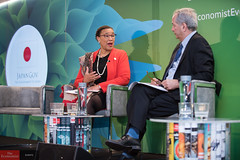What does sustainability mean to you?
Monday 15 April 2019
I recently travelled to London to attend the Economist's Sustainability conference. Here are a few of my observations from the day.
How would you define sustainability? If you are a student or teacher of ESS then you will know that sustainability can be defined as "the use and management of natural resources that allows full natural replacement of the resources exploited and full recovery of the ecosystems affected by their extraction and use". I'm not a huge fan of this rather wordy and dry definition. I prefer to think of sustainability as "living within the means of nature". This perfectly sums up what sustainability means to me.
How do we accomplish this in the anthropocene, the age of man? Consumerism, fuelled by greed and advertising, is wreaking havoc with the environment on a local and global scale. We are pushing the limits of our planetary boundaries, not to mention the devastation caused by the consumption of billions of tons of plastic every year. According to a recent World Economic Forum report "Plastics production has surged over the past 50 years, from 15 million tonnes in 1964 to 311 million tonnes in 2014, and is expected to double again over the next 20 years"

Somewhere along the line it's all gone terribly wrong. What are pragmatic solutions? I wanted to find out how corporations were tackling the issue so went along to this event last month to see for myself.The opening address by Secretary-General: Rt Hon Patricia Scotland QC, was very encouraging. She favoured a technocentric approach and stated that "human genius got us into this mess and human genius will have to get us out!" I heard from sustainability executives from H&M who spoke about how to remain competitive and profitable whilst keeping an eye on sustainability, She suggested educating the consumer to wash their clothes less often, at cooler temperatures and to look after them more, stating that 21% of the environmental impact in a garment's life occurs after it leaves the store; I'm not entirely convinced by her arguments.
You see, as Matt Haig puts it in his book, Notes on a Nervous Planet, "Happiness is NOT good for the economy. We are encouraged, continually, to be a little bit dissatisfied with ourselves". He goes on to explain that "we are being sold the idea of cool via a pair of trousers, we subconsciously feel a pressure to obtain and maintain that coolness" I think, no matter, how well some of these companies try to make us believe they are moving towards sustainability, ultimately their success will not be measured in how they recover and preserve ecosystems, but how big their bottom line is.
will not be measured in how they recover and preserve ecosystems, but how big their bottom line is.
For me, the most encouraging thing I took away from the summit was that mostly all the speakers emphasised the importance of engaging young people in environmental issues at school and increasing the amount of time students spent outdoors learning about the natural world. The themes of innovation and regulation were reinforced and the fact that it was such a popular and well attended event gives hope.


